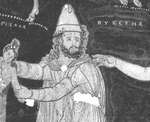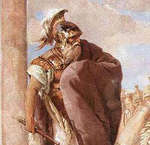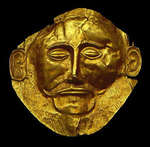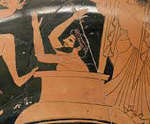
Thyestes
Thyestes was the king of Olympia in Greek mythology, son of Pelops and Hippodamia. He was the brother of Atreus and half-brother of Chrysippus. Thyestes and Atreus plotted and killed Chrysippus in their effort to ascend to the throne of Olympia, an act that caused their father's wrath and their subsequent exile from the region. They found refuge in the court of Mycenae, and managed to usurp the throne from the rightful king, Eurystheus.
When Atreus, who had taken over the throne of Mycenae, decided to sacrifice a lamb in favour of the goddess Artemis, he found a golden lamb, which he gave to his wife, Aerope. She gave it to Thyestes, with whom she had an affair, and then made Atreus agree that whoever had the lamb, would become the king. Thyestes produced the lamb and ascended to the throne.
After being advised by the god Hermes, Atreus told Thyestes to forfeit the throne, which Thyestes agreed to do only if the sun would rise from the west and set in the east. Zeus, wanting to help Atreus, made this happen, and Atreus took the throne. He then found out about his wife's affair with his brother and decided to take revenge. He killed all of his brother's sons, cooked them and served them to Thyestes; this is how the phrase Thyestian Feast was created.
Thyestes wanted to avenge the death of his children and asked an oracle for help; the advice was that if he slept with his daughter Pelopia, the son that would be born would kill Atreus. Thyestes raped his daughter, who after giving birth to Aegisthus, abandoned him. Indeed, years later, when Aegisthus grew up, he killed his uncle and Thyestes took the throne of Mycenae.
Thyestes' nephews, Agamemnon and Menelaus, were exiled by their uncle, and found refuge in the court of King Tyndareus in Sparta. The two brothers plotted against their uncle, and helped by Tyndareus, overthrew Thyestes. Thyestes was forced into exile to Cytheria, the place where he died some time later.
See Also: Pelops, Hippodamia, Atreus, Pelopia, Chrysippus, Eurystheus, Aerope, Hermes, Zeus, Aegisthus, Agamemnon, Menelaus, Tyndareus
Thyestes Q&A
Link/Cite Thyestes Page
Written by: The Editors of GreekMythology.com. GreekMythology.com editors write, review and revise subject areas in which they have extensive knowledge based on their working experience or advanced studies.
For MLA style citation use: GreekMythology.com, The Editors of Website. "Thyestes". GreekMythology.com Website, 18 Jul. 2015, https://www.greekmythology.com/Myths/Mortals/Thyestes/thyestes.html. Accessed 26 April 2024.






